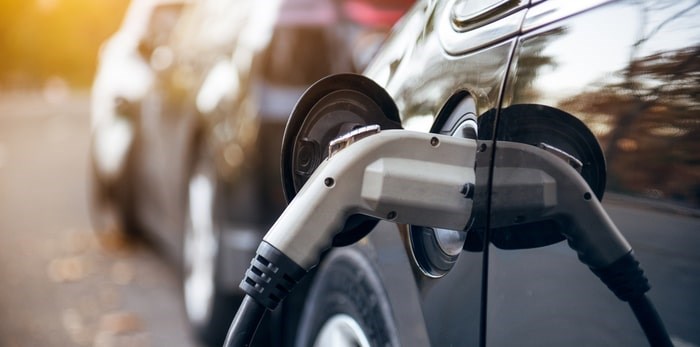The City of Burnaby is launching a pilot program to install electric vehicle (EV) charging stations throughout the municipality.
The new infrastructure will hopefully make life easier for electric car owners, encourage others to consider buying an electric vehicle and, in turn, reduce greenhouse gas emissions, according to a city staff report.
 Electric vehicle charging/Shutterstock
Electric vehicle charging/Shutterstock
“The EV market is expected to continue to grow rapidly over the coming years, but the rate of uptake will still depend in large part on the availability of charging,” reads the report from the city’s director of planning and building, Lou Pelletier, and the director of engineering, Leon Gous.
On Monday, city council approved the report authorizing staff to start the first phase of its pilot program.
Beginning in 2019, the city plans to install charging stations in parking lots at four or more of its existing facilities – potentially including community centres, recreation centres and libraries.
The city has set aside $140,000 for this initial phase, with each “Level 2” charging station expected to cost between $12,000 and $20,000, the report says.
According to the city report, a Level 2 charging station uses a 208V or 240V outlet and can generally be installed in locations with standard electrical infrastructure. “This is the most widely deployed type of EV charging today, and is suitable for home, workplace and public locations,” the report says.
Level 1 charging uses a standard 120V wall outlet but is becoming less common as it charges vehicles relatively slowly, while Direct Current Fast Charging (DCFC) stations charge vehicles much quicker but are more expensive – $50,000 to $100,000 per unit – according to city staff.
Staff say Burnaby is concentrating on installing Level 2 stations right now, but will consider DCFC stations in the future, especially if it can secure funding from other sources, such as BC Hydro and Natural Resources Canada.
Charging at the new stations will not be free.
“Best practices suggest that charging a fee for the service of EV charging is appropriate, as it helps to ensure parking space is not taken up by vehicles that are not utilizing the charging,” the report says.
Under the current rules in B.C., municipalities and landlords can charge for EV charging but private companies cannot, as it is considered “reselling electricity,” according to the report.
Earlier this year, Burnaby’s city council mandated all new residential developments to include EV charging outlets.
Now the city is focused on providing charging infrastructure to residents of existing homes, the report says.
“In the absence of such charging opportunities, purchasing an EV may not be a viable option for many citizens,” the report says.
The pilot project for public charging stations will roll out over the next two years, with further plans for charging stations on public streets and in commercial areas to come in a subsequent report.
The report came before B.C. Premier John Horgan announced Tuesday that all light-duty cars and trucks sold in the province will be required to be zero emission vehicles by 2040.


